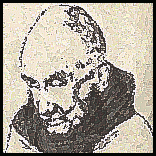
Even scholars who are attempting to find an “independent” and “socio-economic” explanation for Christian origins (such as James Crossley) are, like virtually all scholars involved in this quest, “driven by the Christian imagination” itself. Burton L. Mack explains the nature of this bias in his introduction to A Myth of Innocence: Mark and Christian Origins.
The reader who dares to enter this discourse [of Christian origins] from the humanities or from the social sciences, cannot avoid coming to a certain conclusion. The events that center the massive amounts of scholarly learning are exactly those that haunt the average Christian imagination as well. They are exactly those suggested by the Christian gospel, the gospel that sets them forth as inaugural and foundational for Christian history and faith. (p. 8)
Christians well know that the claims in the Gospel that offer them personal conversion or a new life in Christ are very same ones that also explain the origin of the Church. These are:
- Jesus
- his teachings
- his activities
- the supper
- the cross
- the resurrection
And it is these that are the focus of scholarly studies of Christian origins. Mack continues: Continue reading “The confessional bias of scholarship’s quest for Christian origins”

